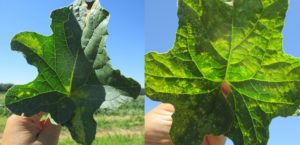Manganese (Mn) toxicity was observed in a cantaloupe field at the Southwest Purdue Agricultural Center this year. This is a plant nutritional disorder related to acid soils and it usually occurs in clusters in a field. A plant tissue test confirmed that the Mn level in the leaves of the affected plants was 3766 ppm, which was 23 times higher than the Mn level in healthy leaves.
The symptom occurs first on older leaves. The diagnostic feature of manganese toxicity is the tiny pin-hole type lesions with yellow halos clustered between the veins. Leaves are best viewed when held up to the light. In severe cases, it may cause heavy defoliation and exposed fruit to sunburn (Figure 1). More photos and information about the symptom can be found in the article Manganese Toxicity in Cantaloupe published in Issue 631 of 2017. The remedy for these disorders is to raise soil pH, but this can be difficult to accomplish during the crop seasons.

Figure 1. chlorosis of manganese toxicity is formed by numerous tiny pin-hole type spots growing together.
The last time we saw Mn toxicity at the Southwest Purdue Agricultural Center was in 2017. Mn toxicity was not a large problem in 2018, a dry year, or 2019, a wet year. It is not clear that weather is a factor in this nutritional disorder. Another problem associated with acid soil in cantaloupe is Magnesium (Mg) deficiency. However, we did not see Mg deficiency at the Southwest Purdue Agricultural Center in the past four years.